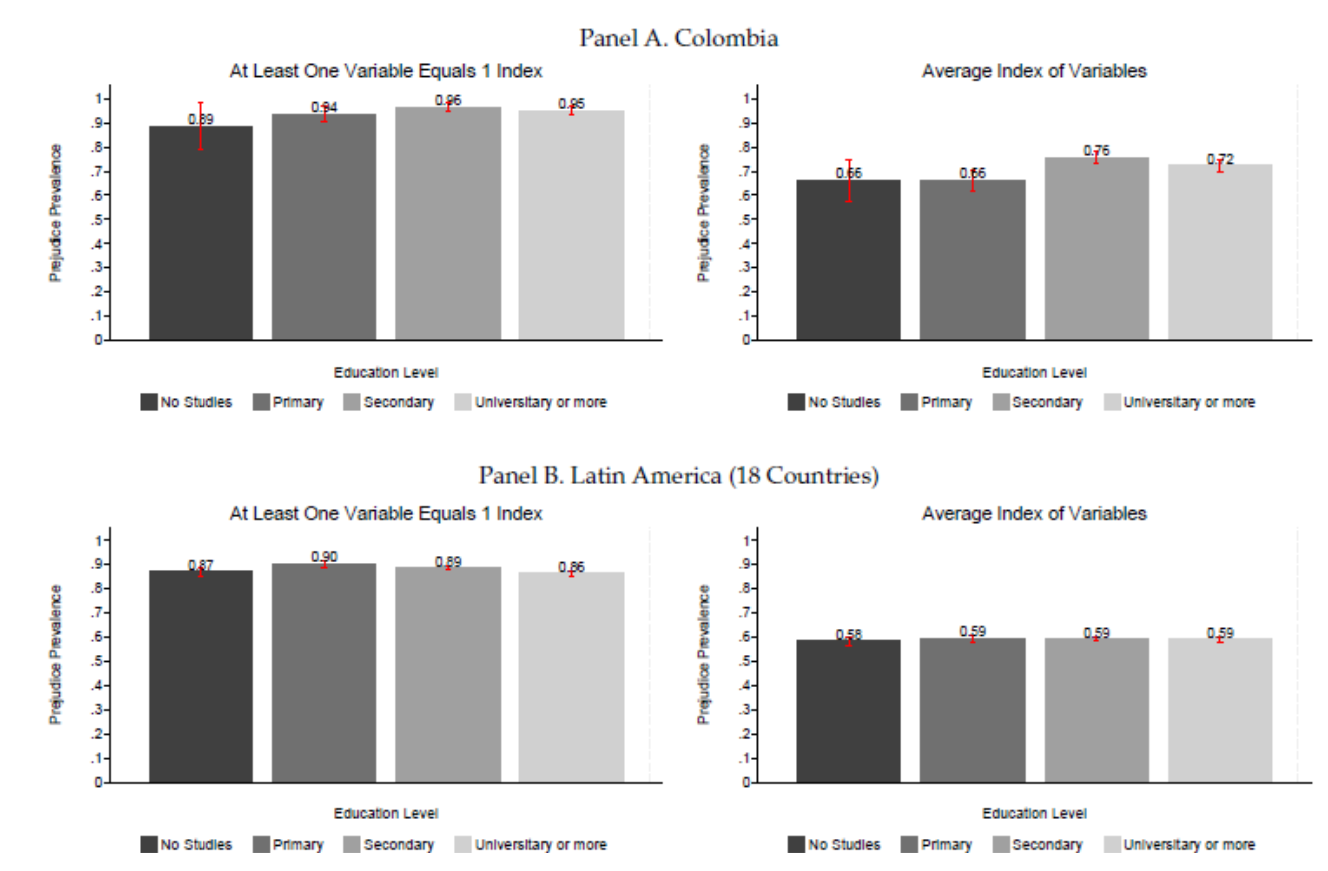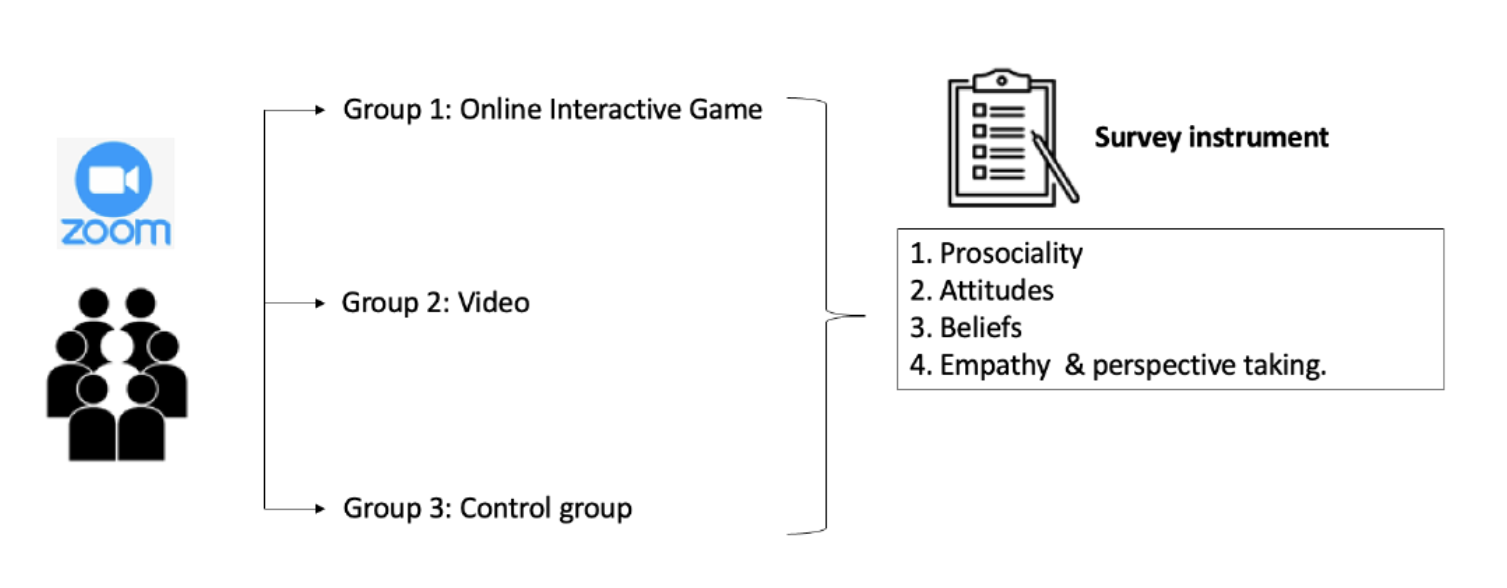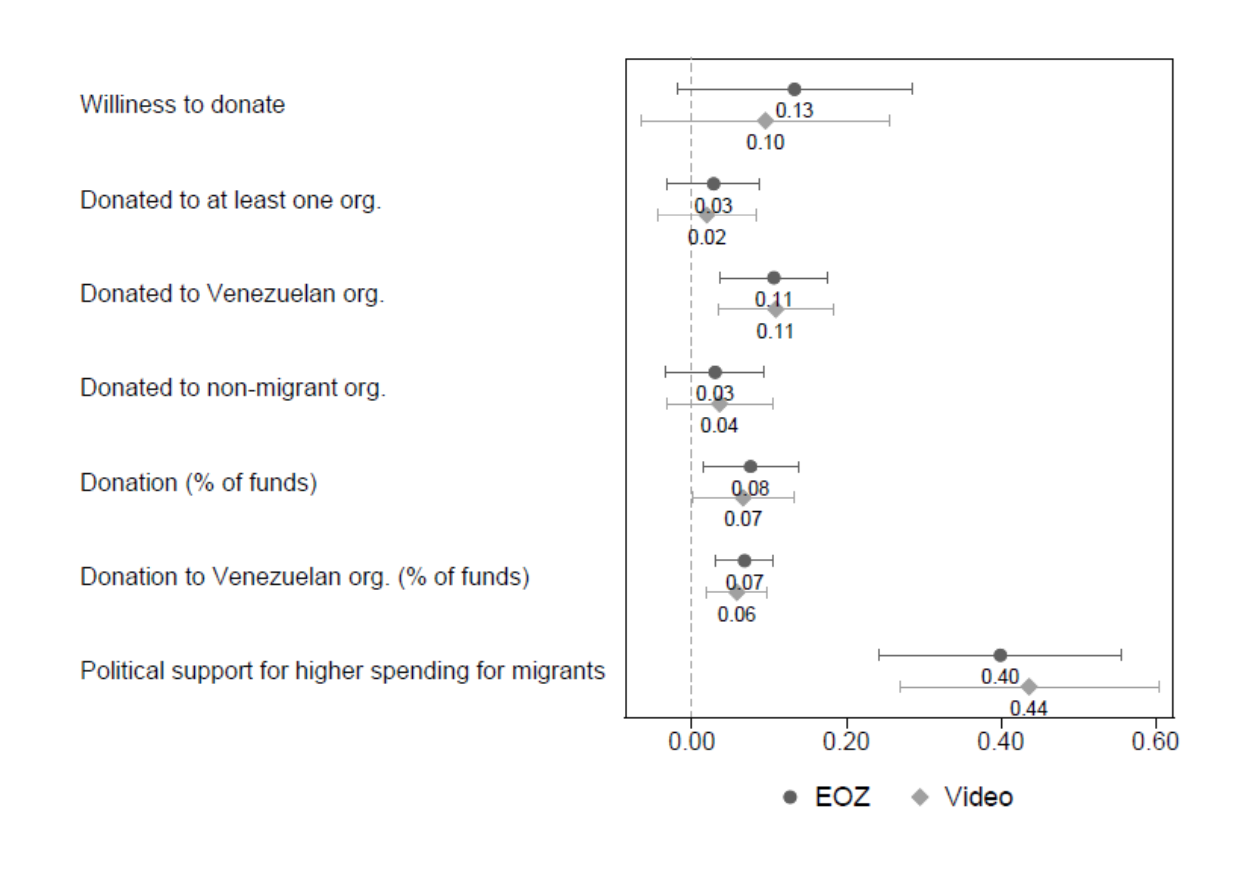
An online, low-cost, scalable intervention that provided information and appealed to participants’ emotions improved prosociality behaviours and attitudes toward forced migrants from Venezuela
Imagine that your country is suddenly hit by an unprecedented war, and you lose everything. What would you do if you no longer felt safe where you live? If your family had no food or supplies and you were worried about their safety? By going through this exercise, you might realise that we all face the risk of becoming forced migrants. Can this realisation help humanity become more understanding and compassionate toward these populations? Can perspective-taking reduce prejudice against forced migrants?
Prejudice is problematic in a society because it can lead to unfair discrimination, inequality, and economic losses. At the individual level it can lead to lower effort and motivation, leading to worse economic achievement, productivity, and wages (Glover et al. 2017, Alesina et al. 2024). At the aggregate level, it can hurt productivity and economic growth (Hjort,2014, Alesina and La Ferrara 2005). In fact, it can even foster resentment between groups, facilitating more conflicts and wars.
With conflicts intensifying year after year, forced migration flows have reached unprecedented levels, with approximately 108 million forced migrants by 2023. Time and time again these inflows are followed by dramatic upsurges of prejudice against migrants. For example, prejudice against Venezuelan forced migrants hosted in Latin America is pervasively high and widespread across all education levels, as suggested by data from Latinobarometro for 18 countries in the region (Figure 1). In this context, strategies to reduce such prejudice should be a policy priority, especially in developing countries that host most of these flows.
Figure 1. Prejudice prevalence by level of education in Latin America

Notes: The figure depicts the average level of prejudice by level of education for both the Colombian population and the aggregate Latin American population. The Prejudice Prevalence variable is constructed using the following indicator variables: (i) Accepting Venezuelan migrants will have a negative impact [=1], (ii) Belief that migrants have a negative impact on the host economy [=1], Belief that migrants compete with hosts for jobs [=1], (iii) Belief that migrants contribute to increased crime [=1], and (iv) Belief that migrants impose a burden on the state [=1]. The At Least One Variable Equals 1 Index equals 1 if any of the aforementioned variables is 1, and the Average Index of Variables is the mean of these variables. The data is extracted from the Latinobarometro survey for the year 2020, which is an annual public opinion survey representing the populations of 18 Latin American countries.
Which interventions can reduce prejudice and still be scalable at a low cost?
We examine the effectiveness of online, low-cost, scalable interventions that provide information while appealing to participants’ emotions. Previous work has shown that providing only information reduces misinformation but does not lessen prejudice (Alesina et al. 2022). Moreover, although interventions that facilitate positive contact between groups have achieved the latter aim, they are extremely difficult to coordinate and expensive to scale up (Mousa 2020, Lowe 2021).
Work grounded in social psychology has yielded promising results of perspective-taking interventions (Hamilton-Giachritsis et al. 2018, Adida et al. 2018; Simonovits et al. 2018). Yet, little evidence exists concerning the online efficacy of these types of interventions or the effects they have in changing actual behaviours toward out-groups.
According to social psychology theory, cognitive-emotional interventions train individuals to use emotion-regulation strategies to fight their personal prejudices (Paluck et al. 2021). Perspective taking encourages individuals to experience the thoughts or emotions of others. This can lead to more favourable attitudes toward that person but also toward members of that person’s group (Galinsky and Moskowitz 2000, Todd and Galinsky 2014).
The experiment: Testing the effects of perspective taking online
To test this hypothesis, we designed an experiment that exposed roughly 900 participants to either an online video or a game (Figure 2). The video is a documentary that depicts the struggles of Venezuelans crossing the Colombian border on foot, including hardships such as freezing temperatures, and sleeping on the streets, and it features first-person testimonies about family separation. Participants in the game assume the role of a Venezuelan migrant and experience her challenges. They receive text and voice messages from her relatives and friends, and they can make decisions in her place—such as where to migrate—that lead to alternative life paths.
Immediately after the interventions, we applied a survey that elicited attitudes and beliefs about migrants and assessed two prosocial behaviours: altruism and trust towards Venezuelans. We measured altruism through participants’ donation behaviours. Particularly, we told participants they would be given an amount of money and then we asked how they would allocate it among themselves, an organisation that helps Venezuelan migrants, and a well-known Colombian nonprofit group that builds houses for vulnerable populations. A control group did not receive any treatment and only took part in the survey.
Figure 2. The Experiment

Who are the participants in our context?
The participants in our intervention are Colombian nationals who recently experienced a drastic change in the demographic composition of their communities due to a massive influx of Venezuelan forced migrants. In just six years, more than 30% of the 2015 population has fled Venezuela and relocated in other countries, making Venezuelans the second largest internationally displaced population after Syrians. Colombia is the main destination country for this contingent, hosting 2.89 million Venezuelans. Attitudes towards Venezuelans have deteriorated markedly in Colombia, as reported in the media, and evidenced by the decline in Gallup’s Migrant Acceptance Index, which in Colombia had the third-largest drop in the world between 2016 and 2019.
Online interventions can successfully improve prosociality toward forced migrants
The interventions successfully improved prosociality behaviours and attitudes toward migrants. Participants assigned to either the game or the video were approximately 11 percentage points more likely to donate to the charity that supports Venezuelan migrants than participants assigned to the control group, equivalent to a 16% increase (Figure 3). The game itself improved self-reported trust towards Venezuelans by 0.29 standard deviations relative to the control group. Regarding attitudes towards migrants, both treatments had a positive impact on the assessment that migrant poverty was due to circumstances beyond a migrant’s control, rather than to a lack of effort on their part. Moreover, both treatments had positive effects on policy attitudes about government assistance to migrants.
Figure 3. Main results

However, per minute spent on each intervention, the video was at least four times more effective than the game in improving prosocial behaviours and attitudes toward forced migrants. This conclusion holds weight, especially considering the game’s demand for greater attention and active engagement, along with its limitation to a specific platform. The video’s shorter duration and seamless scalability across online platforms make it a more favourable choice for fostering prosocial behaviours in the short term.
What are the policy implications?
Our results have important implications. Developing countries host 76% of displaced populations worldwide (UNHCR 2023) and face significant challenges to integration. Governments allocate resources to communications campaigns and other initiatives to promote social cohesion and prevent conflict between groups—all without solid evidence on which programmes are more effective. Online, low-cost interventions like the ones in this paper could promote inclusionary behaviours in schools, colleges, universities, and workplaces in the short run. Short time frames can be relevant to a wide array of decisions with permanent effects on migrants’ well-being, such as hiring decisions by managers and grading decisions by teachers, as well as to sways in public opinion, growth in charitable donations, and improved functioning within teams and groups across various environments. Future studies would do well to explore the sustainability of these effects over the medium to long terms. Moreover, it will be extremely interesting to see whether the effects of these interventions are monotonic as they are scaled in future studies.
References
Adida, C L, A Lo, and M R Platas (2018), "Perspective taking can promote short-term inclusionary behavior toward Syrian refugees", Proceedings of the National Academy of Sciences, 115(38): 9521–9526, http://dx.doi.org/10.1073/pnas.1804002115.
Alesina, A, M Carlana, E La Ferrara, and P Pinotti (2024), "Revealing stereotypes: Evidence from immigrants in schools", American Economic Review, forthcoming.
Alesina, A, P Giuliano, A Bisin, and J Benhabib (2011), "Preferences for redistribution", in Handbook of Social Economics, pp. 93–132, North Holland.
Alesina, A and E La Ferrara (2005), "Ethnic diversity and economic performance", Journal of Economic Literature, 43(3): 762–800.
Alesina, A, A Miano, and S Stantcheva (2022), "Immigration and redistribution", Review of Economic Studies, 90(1): 1–39.
Berthold, A, C Leicht, N Methner, and P Gaum (2013), "Seeing the world with the eyes of the out-group: The impact of perspective taking on the prototypicality of the ingroup relative to the out-group", Journal of Experimental Social Psychology, 49(6): 1034–1041.
Dinas, E, V Fouka, and A Schläpfer (2021), "Family history and attitudes toward out-groups: Evidence from the European refugee crisis", Journal of Politics, 83(2): 647–661.
Galinsky, A and G Moskowitz (2000), "Perspective-taking: Decreasing stereotype expression, stereotype accessibility, and in-group favoritism", Journal of Personality and Social Psychology, 78(4): 708.
Glover, D, A Pallais, and W Pariente (2017), "Discrimination as a self-fulfilling prophecy: Evidence from French Grocery Stores", Quarterly Journal of Economics, 132(3): 1219–1260.
Green, M C and T C Brock (2000), "The role of transportation in the persuasiveness of public narratives", Journal of Personality and Social Psychology, 79(5): 701.
Grigorieff, A, C Roth, and D Ubfal (2020), "Does information change attitudes toward immigrants?", Demography, 57(3): 1117–1143.
Hamilton-Giachritsis, C, D Banakou, M Garcia Quiroga, C Giachritsis, and M Slater (2018), "Reducing risk and improving maternal perspective-taking and empathy using virtual embodiment", Scientific Reports.
Hjort, J (2014), "Ethnic divisions and production in firms", Quarterly Journal of Economics, 129(4): 1899–1946.
Hopkins, D J, J Sides, and J Citrin (2019), "The muted consequences of correct information about immigration", Journal of Politics, 81(1): 315–320.
Kalla, J L and D E Broockman (2023), "Which narrative strategies durably reduce prejudice? Evidence from field and survey experiments supporting the efficacy of perspective-getting", American Journal of Political Science, 67(1): 185–204.
Lowe, M (2021), "Types of contact: A field experiment on collaborative and adversarial caste integration", American Economic Review, 111(6): 1807–1844.
Mousa, S (2020), "Building social cohesion between Christians and Muslims through soccer in post-ISIS Iraq", Science, 369(6505): 866–870.
Nabi, R L and M C Green (2015), "The role of a narrative’s emotional flow in promoting persuasive outcomes", Media Psychology, 18(2): 137–162.
Paluck, E L and D P Green (2009), "Prejudice reduction: What works? A review and assessment of research and practice", Annual Review of Psychology, 60: 339–367.
Paluck, E, R Porat, C Clark, and D Green (2021), "Prejudice reduction: Progress and challenges", Annual Review of Psychology, 72.
Simonovits, G, G Kezdi, and P Kardos (2018), "Seeing the world through the other’s eye: An online intervention reducing ethnic prejudice", American Political Science Review, 112(1): 186–193.
Stewart, T, J Laduke, C Bracht, B Sweet, and K Gamarel (2003), "Do the ‘‘eyes’’ have it? A program evaluation of Jane Elliott’s ‘‘blue-eyes/brown-eyes’’ diversity training exercise", Journal of Applied Social Psychology, 33(9): 1898–1921.
Stichnoth, H and K Van der Straeten (2013), "Ethnic diversity, public spending, and individual support for the welfare state: A review of the empirical literature", Journal of Economic Surveys, 27(2): 364–389.
Tabellini, M (2020), "Gifts of the immigrants, woes of the natives: Lessons from the age of mass migration", Review of Economic Studies, 87(1): 454–486.
Todd, A R and A D Galinsky (2014), "Perspective-taking as a strategy for improving intergroup relations: Evidence, mechanisms, and qualifications", Social and Personality Psychology Compass, 8(7): 374–387.
UNHCR (2023), "Global Trends: Forced Displacement in 2023", https://www.unhcr.org/statistics/unhcrstats/60ab27f37/global-trends-forced-displacement-2023.html.


